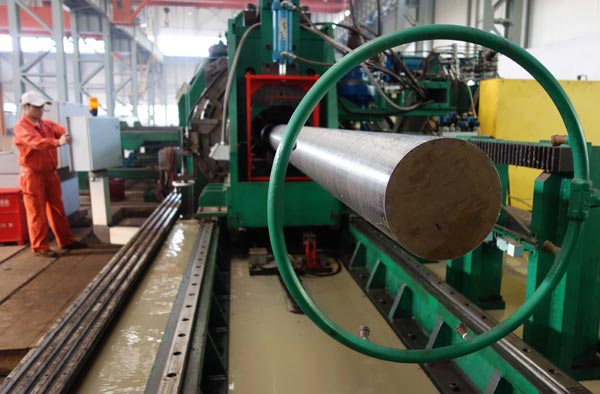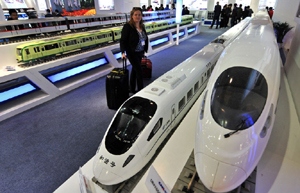

|
 |
|
A worker working at steel mill at Dalian, Northeast China's Liaoning province, Oct 13 2013.[Photo/China Daily] |
Industrial utilization rate to continue declining without government intervention, analysts say
China's top economic planner has pledged to take unprecedented steps to tackle industrial overcapacity as official data suggest the rate of industrial capacity utilization in the first half of the year hit a four-year low.
"Although overcapacity is an old and periodic problem that arises about every five years, it was not as serious before as it is now," said Li Zhongjuan, an inspector of industrial planning for the National Development and Reform Commission.
The National Bureau of Statistics said that the rate of industrial capacity utilization in China in the first half of 2013 stood at 78 percent on average, the lowest since the fourth quarter of 2009.
Analysts believe the rate will continue to dip if the government does not intervene, as a great deal of infrastructure construction and investment in the industries is still going on.
By contrast, the industrial capacity utilization rate in the United States rose steadily from 77.9 percent to 78.3 percent in the third quarter, the highest since July 2008, the US Federal Reserve said.
Zhu Min, deputy managing director of the International Monetary Fund, warned at a forum in Beijing earlier this year that the industrial utilization rate has dropped from 90 percent to as low as 60 percent in China and flags a serious overcapacity issue, which begets a low return on investment and becomes an obstacle hindering China's rise in the global value chain, despite its important position in the global industrial chain.
Capacity utilization rates of 21 out of 39 sampled main products have fallen below 75 percent in China.
Among those, photovoltaic products and calcium carbide's rates fell even lower, to under 60 percent.
By the end of 2012, the capacity utilization rate was 72 percent for iron and steel, 73.7 percent for cement, 71.9 percent for electrolytic aluminum, 73.1 percent for sheet glass and 75 percent for the shipbuilding industry.
"If unchecked, overcapacity will aggravate the vicious competition, enlarge the industrial losses, increase banks' non-performing assets, and waste material and human resources," warned the State Council's guideline on solving overcapacity, which was released on Oct 15.
The guideline indicated that industries suffering from overcapacity may be weeded out, transferred or merged.
The core task is to "control new growth, optimizing existing ones through a long-term mechanism", the guideline said.
Some industries will be moved to industrial parks or designated regions from scattered urban and suburban areas, and the government will use pricing policies in electricity, water and land to force others to exit from the market or seek innovation.
As a response to air pollution problems in North China, "restructuring the iron and steel industries of Shandong, Hebei, Liaoning, Shanxi and Jiangxi will be a key task to streamline the industry", noted Li of the development and reform commission.
 Hot models shining at Auto Guangzhou 2013
Hot models shining at Auto Guangzhou 2013
 Survey: Big strides in domestic auto quality
Survey: Big strides in domestic auto quality
 Auto Guangzhou witnesses new Porsche sports cars Asia Premiere
Auto Guangzhou witnesses new Porsche sports cars Asia Premiere
 Rise of the south's biggest show
Rise of the south's biggest show
 Sew be it
Sew be it
 Latest trend in tram
Latest trend in tram
 CCTV 2014 advertising auction kicks off in Beijing
CCTV 2014 advertising auction kicks off in Beijing
 Toyota TMEC opens hybrid tech R&D operations
Toyota TMEC opens hybrid tech R&D operations